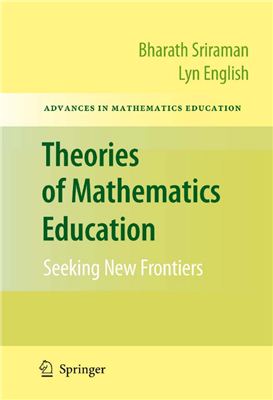Springer, 2009. - 668 pages.
This inaugural book in the new series Advances in Mathematics Education is the most up to date, comprehensive and avant garde treatment of Theories of Mathematics Education which use two highly acclaimed ZDM special issues on theories of mathematics education (issue 6/2005 and issue 1/2006), as a point of departure. Historically grounded in the Theories of Mathematics Education (TME group) revived by the book editors at the 29th Annual PME meeting in Melboue and using the unique style of preface-chapter-commentary, this volume consist of contributions from leading thinkers in mathematics education who have worked on theory building.
This book is as much summative and synthetic as well as forward-looking by highlighting theories from psychology, philosophy and social sciences that continue to influence theory building. In addition a significant portion of the book includes newer developments in areas within mathematics education such as complexity theory, neurosciences, modeling, critical theory, feminist theory, social justice theory and networking theories. The 19 parts, 17 prefaces and 23 commentaries synergize the efforts of over 50 contributing authors scattered across the globe that are active in the ongoing work on theory development in mathematics education.
This inaugural book in the new series Advances in Mathematics Education is the most up to date, comprehensive and avant garde treatment of Theories of Mathematics Education which use two highly acclaimed ZDM special issues on theories of mathematics education (issue 6/2005 and issue 1/2006), as a point of departure. Historically grounded in the Theories of Mathematics Education (TME group) revived by the book editors at the 29th Annual PME meeting in Melboue and using the unique style of preface-chapter-commentary, this volume consist of contributions from leading thinkers in mathematics education who have worked on theory building.
This book is as much summative and synthetic as well as forward-looking by highlighting theories from psychology, philosophy and social sciences that continue to influence theory building. In addition a significant portion of the book includes newer developments in areas within mathematics education such as complexity theory, neurosciences, modeling, critical theory, feminist theory, social justice theory and networking theories. The 19 parts, 17 prefaces and 23 commentaries synergize the efforts of over 50 contributing authors scattered across the globe that are active in the ongoing work on theory development in mathematics education.

